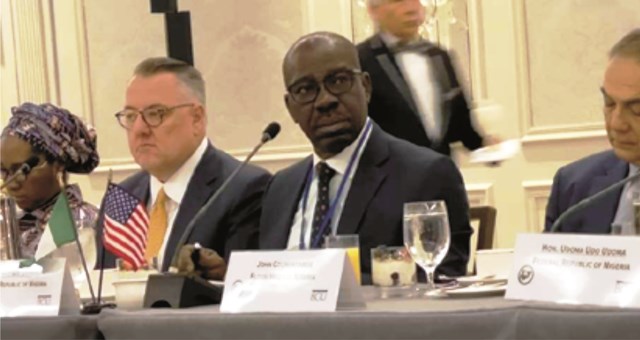Business
NDIC Restates Commitment To Deepen Financial Inclusion

The Nigeria Deposit Insurance Corporation (NDIC) has reiterated its commitment to deepen financial inclusion in the country.
The corporation’s Managing Director , Mr Umaru Ibrahim made this known at the NDIC’s Special Day at the ongoing Abuja International Trade Fair.
The theme of the fair is, “Enhancing SMEs in Agribusiness through Innovative Technology”.
Umaru said the corporation was implementing the National Financial Inclusion Strategy by adopting various public awareness activities to achieve its purpose.
He named some of the activities to include World Savings Day, promotion of financial literacy among youths in secondary schools, TV and Radio jingles and workshop for Business Editors and Financial Correspondents.
While commending the Abuja Chamber of Commerce and Industry (ACCI) on the theme of the fair, Umaru pledged NDIC’s support to the development of small businesses in the country.
“The theme could not have been more apt, given the determination of the current administration to achieve inclusive economic growth, especially through the development of agriculture sector.
“As key player in the Nigerian financial system, the NDIC is resolute in its determination to complement the roles of other regulators and institutions.
“We will ensure that the soundness and stability required to support agro-based small and medium enterprises is provided.’’
Umaru restated NDIC’s commitment to protect bank depositors and promote public confidence in the financial system.
He described NDIC as a corporation that minimises risk, protects depositors by collaborating with the CBN for effective supervision of banks, offering timely resolution of distressed financial institutions.
According to him, when various resolution measures fail, NDIC liquidates the failed banks and ensure prompt payment of all insured deposits.
He said that the corporation as at Dec. 31, 2017 had paid N11.50 billion to depositors, creditors, shareholders and other stakeholders of closed financial institutions.
The NDIC boss said that the corporation was also collaborating with the CBN to ensure financial system stability in the country.
He said that the corporation had made a cumulative recovery of N28.84billion from debtors of failed banks and N21.85 billion had been realised from disposal of physical assets of closed banks as at Dec.31, 2017.
Business
Agency Gives Insight Into Its Inspection, Monitoring Operations

Business
BVN Enrolments Rise 6% To 67.8m In 2025 — NIBSS

The Nigeria Inter-Bank Settlement System (NIBSS) has said that Bank Verification Number (BVN) enrolments rose by 6.8 per cent year-on-year to 67.8 million as at December 2025, up from 63.5 million recorded in the corresponding period of 2024.
In a statement published on its website, NIBSS attributed the growth to stronger policy enforcement by the Central Bank of Nigeria (CBN) and the expansion of diaspora enrolment initiatives.
NIBSS noted that the expansion reinforces the BVN system’s central role in Nigeria’s financial inclusion drive and digital identity framework.
Another major driver, the statement said, was the rollout of the Non-Resident Bank Verification Number (NRBVN) initiative, which allows Nigerians in the diaspora to obtain a BVN remotely without physical presence in the country.
A five-year analysis by NIBSS showed consistent growth in BVN enrolments, rising from 51.9 million in 2021 to 56.0 million in 2022, 60.1 million in 2023, 63.5 million in 2024 and 67.8 million by December 2025. The steady increase reflects stronger compliance with biometric identity requirements and improved coverage of the national banking identity system.
However, NIBSS noted that BVN enrolments still lag the total number of active bank accounts, which exceeded 320 million as of March 2025.
The gap, it explained, is largely due to multiple bank accounts linked to single BVNs, as well as customers yet to complete enrolment, despite the progress recorded.
Business
AFAN Unveils Plans To Boost Food Production In 2026
-

 News4 days ago
News4 days agoOji Clears Air On Appointment Of 15 Special Advisers By Fubara
-

 News4 days ago
News4 days agoNigeria Has Woken Up From Slumber Under Tinubu – Shettima
-

 Featured4 days ago
Featured4 days agoRivers: Impeachment Moves Against Fubara, Deputy Hits Rock …As CJ Declines Setting Up Panel
-
City Crime4 days ago
Health Commissioner Extols Fubara’s Commitment To Community Healthcare Delivery
-
News4 days ago
Nigeria To Begin Exporting Urea In 2028 -NMDPRA
-
Niger Delta4 days ago
Tinubu, Leading Nigeria To Sustainable Future – Okowa … Lauds Oborevwori Over Uromi Junction Flyover Construction
-

 News4 days ago
News4 days agoKing Jaja Impacted Beyond Rivers -Deputy Gov
-
News4 days ago
US – Nigeria Security Engagement Translating Into Tangible Operational Gains – NSA

